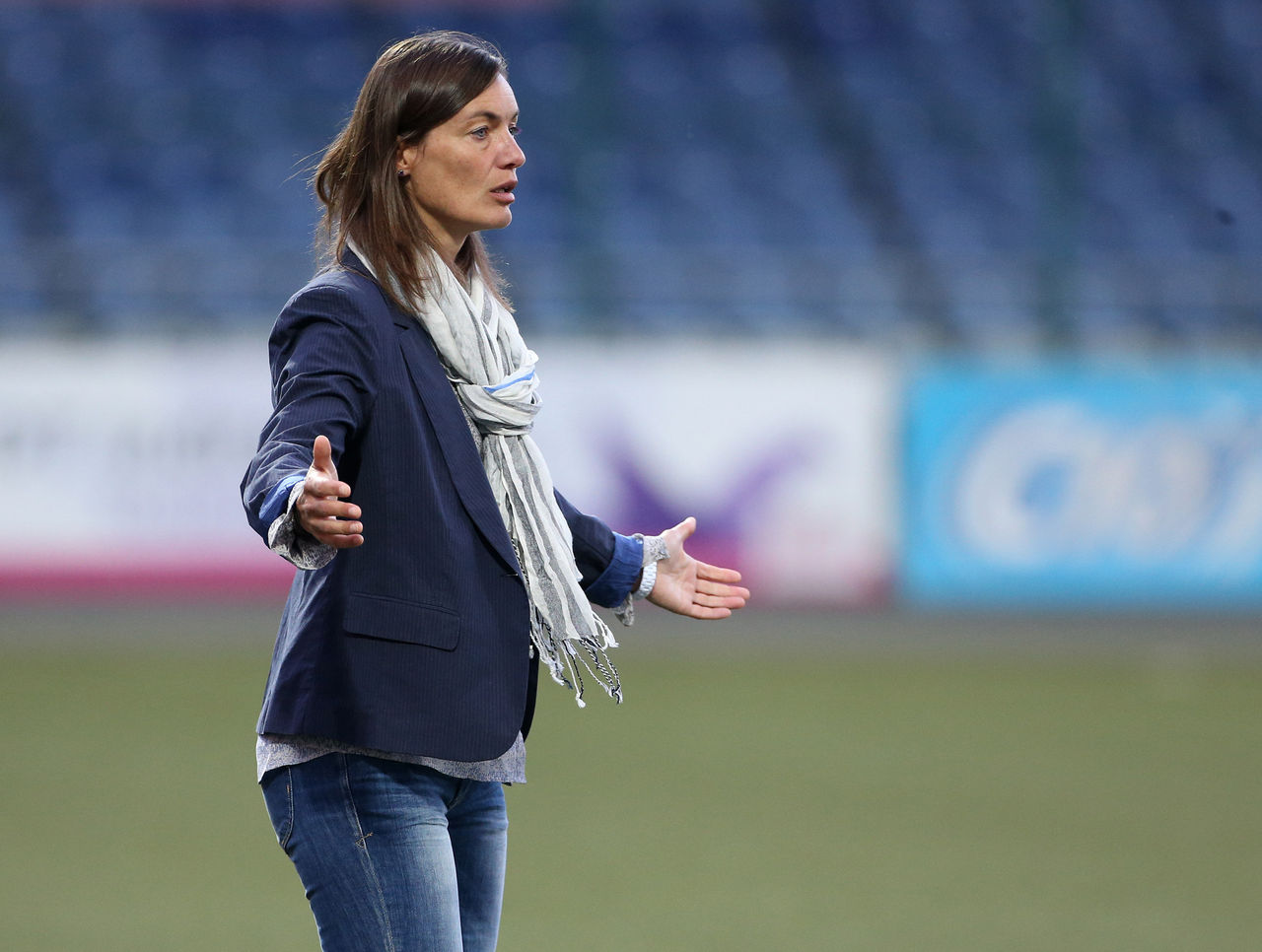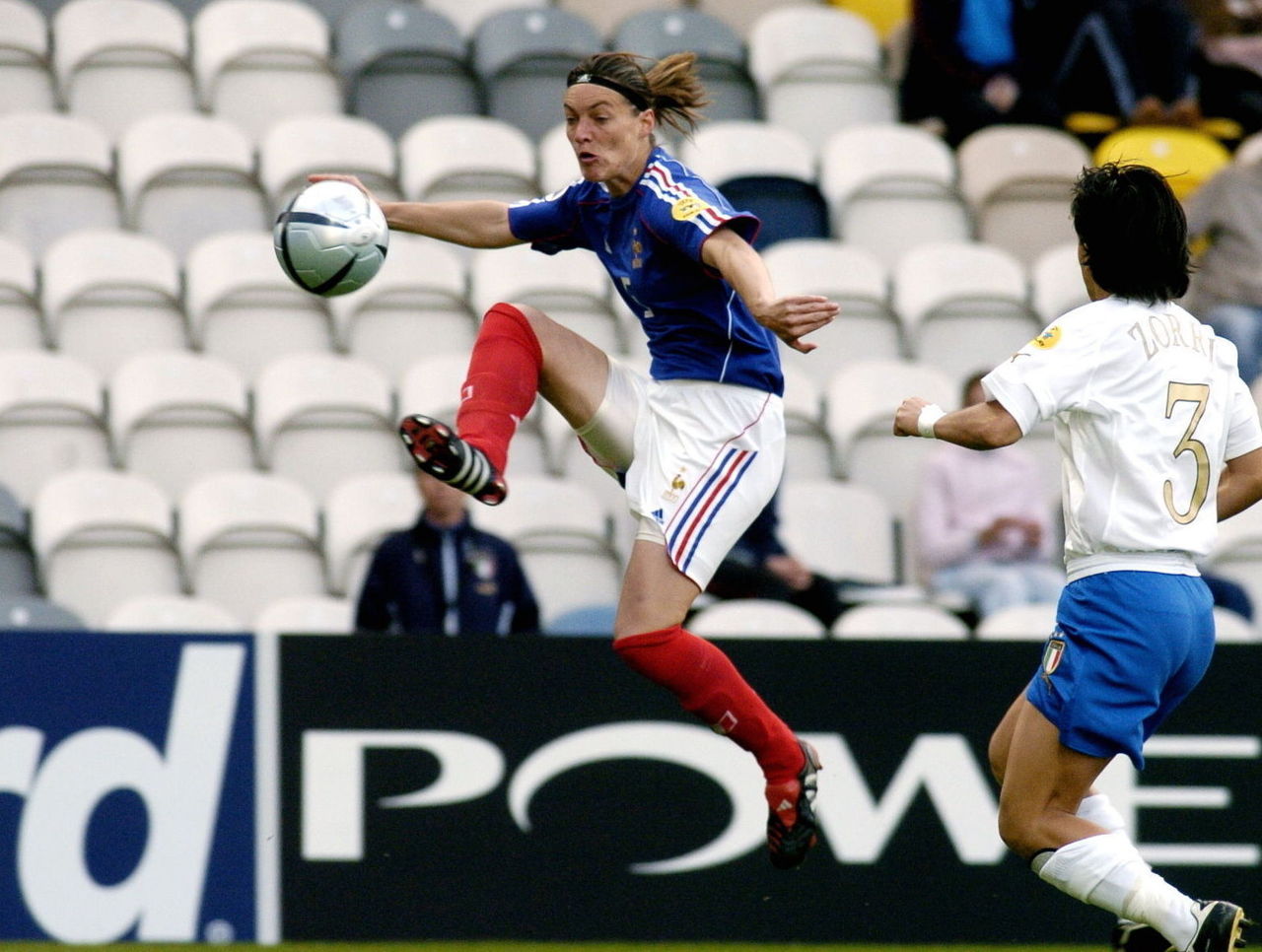Corinne Diacre: Clermont Foot's barrier-busting boss
The French top flight could be slated for a potentially boundary-smashing addition, and much of the footballing world doesn't appear to have taken note.
Should Clermont Foot muster a second-stanza run of form to nab a Ligue 2 promotion spot, Corinne Diacre will become the first woman to manage a professional side in one of Europe's top-tiered leagues.
What was once a pipe dream for many is now 17 matches from fruition.
Clermont Foot sits fourth in France's second tier on the heels of last year's 12th-place finish that inspired the Auvergne-based club to extend Diacre's contract through June 2018.
She's already had the honour of being the first woman to boss a side in the top two tiers of the continent after being named Clermont's boss in June 2014.
The 121-time capped French international captain isn't the first woman to take the helm of a European football club, but she is the first to manage one in a competitive match.
Coincidentally, the first woman to manage a second-tier side was Diacre's predecessor, Helena Costa, who stepped down after only one training session in June 2014, saying her appointment was a vacuous and superficial attempt to garner attention.
Costa - who picked up the moniker "Mourinho in a skirt" after a spell alongside compatriot Jose Mourinho at Benfica - added that she was left out of the loop on a host of decisions a manager would typically have input in, prompting her decision to quit.
A hiring that garnered praise from the likes of then-French Women's Affairs Minister Najat Vallaud-Belkacem - who congratulated Clermont Foot for "understanding that giving a place to women is the future of professional football" - collapsed as quickly as it was announced.
The Portuguese coach's claims were gift wrapped and substantiated by Clermont president Claude Michy, who offered a comical opinion following Costa's departure.
"She's a woman so it could be down to any number of things … it's an astonishing, irrational, and incomprehensible decision. She's developed a confidence problem, but I don't know what it was that caused this."
Surely Michy understands that causation is the causal liaison between conduct and result. Perhaps not, though his backing of a second female manager appears of genuine interests.
Not surprisingly, the fact that Michy's comments about Costa's reasoning for vacating her position preceded the appointment of Diacre a fortnight later was met with some skepticism.
That's not something Diacre has control over.
Her credentials were scrutinized more so than those of her male counterparts, and despite a decorated 22-year career for both club and country, her appointment was muddied by the conditions of her predecessor’s departure.

Clermont Foot isn't Diacre's maiden voyage into managing, though it is her first in an industry dominated by men.
Formerly an assistant with the French national women's team and a manager of former club side Soyaux, the ex-defender cut her teeth in an environment where female gaffers are becoming commonplace.
Choral and vociferous as a commander on the pitch, Diacre is as stoic and taciturn off it, letting her tactics and the results do the talking. She's been met with an unwarranted amount of criticism that her colleagues haven't had to deal with, both voiced publicly and muttered privately between peers in dimly lit bistros and boardrooms.
Even in the face of opposition, Diacre doesn't seem concerned. She's tired of talking about it, though, so she doesn't agree to many interviews anymore.
"Yes, I had to say stop," Diacre told France Football.
"And the worst thing was that at a certain point I didn't even have the answers to the questions that were being asked of me.
"Why am I the only woman? How am I different from the others? I didn't know."
Again, she has no control over it.
In fourth place and within reach of promotion all season, Diacre has proven her critics wrong for a club that, despite having the second-lowest budget in the second-tier, is far from an insignificant afterthought in the annals of French football.
Originally formed in 1911 but altered in 1984 following a merger between Stade-Clermontois and AS Montferrand, Foot has risen a rung to Ligue 2 where it's languished for a dozen years, producing talents like Guingamp duo Yanis Salibur and Sloan Privat.
Sochaux loanee Famara Diedhiou, 23, has been a revelation under Diacre, leading Ligue 2 in scoring with 19 goals - nine better than second-best Pape Sane. For the promotion push, the club added Bordeaux forward Gaetan Laborde on loan during the January window in hopes he can replicate his 14-goal season with fellow second-tier side Red Star. There's plenty to be optimistic about for the league's second-highest scoring outfit.
With no sporting director at the club, Diacre's also tasked with recruitment duties, further proving Michy's second appointment of a female manager has been more palpable than the first.
Diacre appears to agree, telling France Football that part of her motivation for leading Clermont to Ligue 1 is "not to annoy people who were against (her) arrival, but for the risk-taking of the president."

Even at the helm of a surging side, archaic gender norms and preconceptions aren't the only things standing in Diacre's way.
The French Football League (LFP) decided in May 2015 that the French top flight would only relegate two clubs this season, becoming the first major league in Europe to do so.
In an effort to give investors more security, the LFP planned to cut the number of teams destined for the drop by a third, with Evian Thonon-Gaillard having the unfortunate honour of being the last club to finish 18th and go down.
While many cry foul that the proposed change is yet another victory for the business side of European football and a loss for the spirit of competition, promotion hopefuls - AS Nancy, Dijon, Le Havre, Clermont, and Metz - can be excused for regarding the change in more self-referential terms.
This alteration was slated to become another obstacle for the Clermont gaffer to overcome, with one less spot to aim for in the Ligue 2 promotion push. After all, Nancy and Dijon sit first and second, respectively, with a cushion of nine and seven points on the Occitanians.
In late July, Le Conseil D'Etat (a body of French national government) and the French Football Federation (FFF) overturned the decision from the LFP, again providing hope to those on the fringes of a promotion push. LFP president Frederic Thiriez promised to appeal the judgment, which has invariably shrouded next season for members of France's top two tiers.
Regardless of the result, it amounts to something else Diacre has no control over.
In addition to the issues off the pitch, on-field performance can obviously stand in the way of Clermont Foot's bid for top-flight football.
On Friday, the club faced relegation fodder Nimes, falling 6-2 in its most lopsided loss of the year following a spell of three consecutive wins in which it outscored opponents 10-3. Now, the odds are stacked against Clermont and its boundary-busting manager.
Next Monday's home match against third place Le Havre at the Stade Gabriel Montpied looms large, as Clermont has a chance to leapfrog the Normands into third spot. A loss, though, could see Metz, RC Lens, or Red Star overtake the Auvergnes.
Even with the hindrance of near insurmountable hurdles in her path and no guarantee she'll be retained in lieu of a promotion to Ligue 1, Diacre has shown she's anything but a pushover when it comes to overcoming the preposterous.
Barriers are meant to be shattered, and Diacre has proven something that didn't require justification in her one-and-a-half seasons with the club, maintaining the same goal from the day she was hired.
"The dream would be able to get promoted into Ligue 1 with Clermont."
And that's something Diacre does have control over.